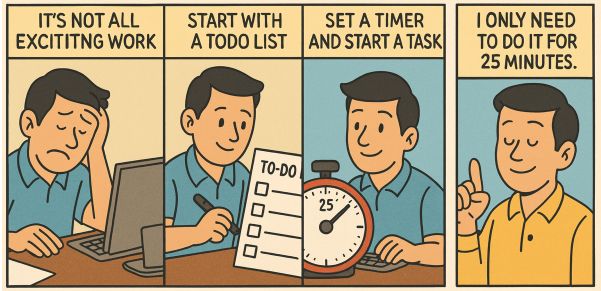People often assume that being an engineer in the software development fiel, I spend all my time solving the most complex and exciting problems out there. While that’s partly true, the reality is a little less glamorous.
Yes, some days are filled with creative challenges like hunting down obscure bugs, brainstorming design decisions, or debating architecture trade-offs. Those days make you glad you chose this field. But every now and then, even we engineers are subjected to the “non–grey-cell-consuming,” soul-crushing, boring, mundane tasks as well. And the irony is, you really can’t have one without the other.
Now, from my experience, I found that I have a tendency to procrastinate all these mundane not-so interesting work until the last minute. And one fine day I walk into my office, open my office email, and BOOM ! my manager needs the report in the next hour. I start cursing msyself for neglecting it so long, and start working on it asap ignoring that cup of coffee I brought in to drink. Needless to say, it causes a lot of stress, and also takes valuable time away from more important work that I actually want to attend to.
I’ve tried many ways to fix this, but one of the most effective methods that works for me is the Pomodoro Technique.
Quoting directly from Wikipedia:
“The technique uses a timer to break down work into 25-minute intervals, called ‘Pomodori’ (from the Italian word for ‘tomatoes’), separated by short breaks.”
Here’s how I use it to tackle routine tasks at work these days:

- Start with a TODO list. Each morning, I jot down the tasks I need to complete.
- Pick the boring stuff first. I usually slot mundane tasks into one part of the day (often post-lunch, unless something urgent is due earlier).
- Set a timer. Before starting, I set a 25-minute timer and dive in.
- Break and repeat. After 25 minutes, I take a 5–10 minute break, then set another timer, and repeat until the task is done.
Why This Works ?
For me, it comes down to psychological relief. When I start a 25-minute timer, I’m telling myself: “Hey, it’s fine. Even if this task is boring, you only have to survive it for 25 minutes.”
Ironically, I’ve found that by the time the 25 minutes are up, the work doesn’t feel as boring anymore. In fact, sometimes I skip the break and just keep going until it’s done.
So, there you go, that’s my little productivity hack for taming the routine, mundane works of software life.